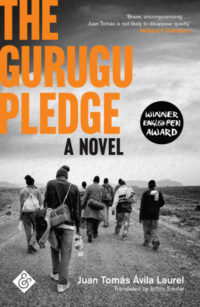Whichever history the whites chose for you
 The Gurugu Pledge
The Gurugu Pledge
by Juan Tomás Ávila Laurel
translated by Jethro Soutar
This is the first of three books I read last weekend that create fiction from real-life accounts. It hadn’t even occurred to me before that was a genre!
On the Gurugu mountain in Morocco next to the border with the small Spanish enclave of Melilla, people from all over Africa hide in caves and tents in a makeshift camp, waiting to make their attempt on the border wall that could get them to European soil. To pass the time, the people on Gurugu mountain tell stories about where they have come from and play football (which also keeps them warm on this northerly point of the continent).
“There are some five hundred of us, black Africans all, and we just want to live, you know? We just want to live, but living is a serious business in Africa, for it’s often very hard and lots of people barely manage it…we need to eat. Do you understand me, Sir? Eat or manger, according to whichever history the whites chose for you.”
The stories they tell are sometimes mundane or funny and sometimes surreal, sometimes upsetting. They are stories of everyday life back home (exact location rarely given) and stories of strange things that happened in their past. Sometimes they are stories that go nowhere, and the storyteller’s fellow travellers tease him for the lost thread.
The harshest reality is the one on Gurugu itself. There are hints from early on that something terrible has happened, but the reveals are slow, and the truth is horrible. Ávila Laurel obscures the facts with switches in voice and perspective. Sometimes the narrator holds imaginary conversations with visiting “learned scholars”, injecting a sense of humour by addressing questions such as the importance of football, or how exactly the occupants of Gurugu could best make use of an elephant. But there is an angry edge to the humour.
“Any European country with a lying demagogue for a leader can talk about integration until the cows come home, without doing anything to make it happen. Yet thanks to football, black children living in Europe have people of their own race to look up to…You can’t expect a child, no matter how humble, to say when I grow up I want to be an agency cleaner at Charles de Gaulle airport. Or when I grow up I want to be a fake-handbag salesman…These aren’t professions. It’s football that teaches children that black people get to go on TV, get to be admired and applauded.”
This book really conveys what it is like for African migrants trying to cross into the Europe (or at least I felt that it had been conveyed – obviously I don’t actually know what it’s like). There’s everyday mundanity and there’s clinging-to-life desperation. I started the book laughing and I left it fighting back tears.
Published 2017 by And Other Stories.
Source: I subscribe to the publisher.